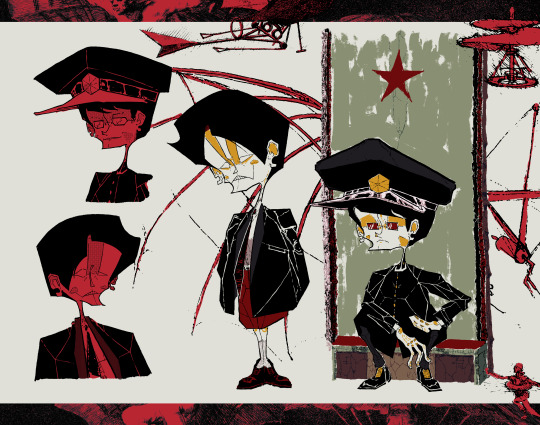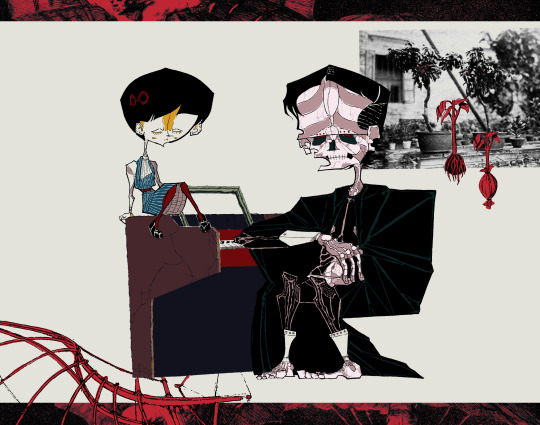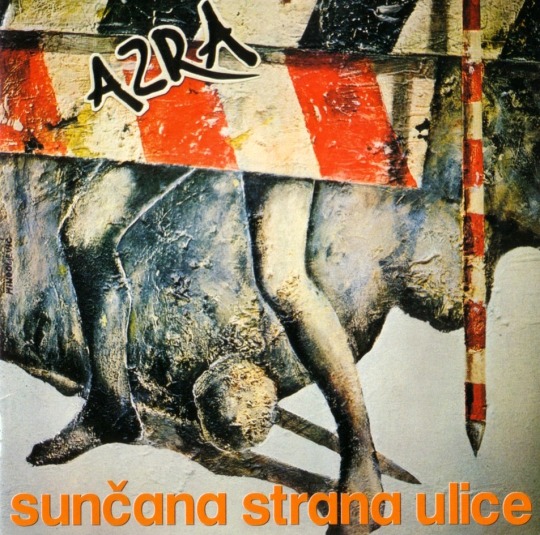#nova akropola
Explore tagged Tumblr posts
Text

!!!
Nova Akropola remastered.
6 notes
·
View notes
Text










My albums selection for the next week , open your ears:
Harvestman – Triptych Part Two
Nile – The Underworld Awaits Us All
Puce Mary – The Drought
The The – Ensoulment
Gysi / Gerber / Hollinger – Die Hand
Nine Inch Nails – Things Falling Apart
Laibach – Nova Akropola
Malaria! – Emotion
Xordox – Neospection
The Legendary Pink Dots - Live in Kontich 1986
#musical selection#harvestman#nile#puce mary#the the#nine inch nails#laibach#malaria!#xordox#jg thirlwell#the legendary pink dots#experimental music#pop rock#synth pop#post punk#cold wave#metal#industrial music#electronic music
11 notes
·
View notes
Text
14 notes
·
View notes
Text
youtube
laibach -- nova akropola
6 notes
·
View notes
Photo


Concept drawings for a nonspecific project inspired by the theater version of Lychee Light Club. The idea has been discussed in relation to the ongoing planning for the puppet version of Mercuro, with the Lychee concept going back and forth between either being a comic or a film. Similar to how Furuya did his own reinterpretation of the play from his personal recollections, the basic concept is to analyze the surviving elements of the play’s script along with audience and participant recollections to do a unique narrative that adapts the play’s original subtexts.
The project’s primary focus would be on the play’s utilization of cyberpunk horror aesthetics as a metaphor for fascism and the relations between imperial Japan and Germany in WWII. By all recollections, it was said that a primary theme of the play was the light club’s ideologies of technological advancement over mankind. The club members swear a supremacy of machinery over human flesh, with them holding a special hatred for women, who they liken with landraces. Most infamously, the members have their genitals replaced with iron phalluses that they use as a weapon to kill the girls they kidnap. Their technological fetishism is frequently paired with fascist implications, from their authoritarian mannerisms to the frequent references to Nazism they make in conversation to the very detail that all the technology they surround themselves with is German in origin. Jaibo himself is implied to be a German transfer student who, if not a coconspirator with Zera, is a possible puppet master behind the whole light club. Even minute roles like the Marquis De Maruo’s reflect this in how with the play, he appears as an elderly man who shows the light club autopsy videos while giving them sweets that he mythologizes as being the same candies that were liked by Adolf Hitler during his youth. In this context, the club represents a dystopic mechanized fascism that makes Lychee’s own existence paradoxical. Despite being a full-fledged product of their inhuman idealizations of machinery, he becomes human through his empathy for their hostages. As represented in the manga, he is programmed to recognize beauty when a code is implemented that convinces him that he’s human. The underlying motive behind the adaption is, like my other horror projects, to express political conflict through surrealistic horror. To show a warning of how fascism germinates in future generations through the means of a story that seems to tackle the same themes in a manner that directly attacks the subconscious. As a product of the Japanese underground, guro’s histories are inherently riddled in political conflict and action, much like how surrealism and its adjacent authors and conceptual muses were conceived in periods of warfare. Octave Mirbeau conceived The Torture Garden from the alienation he felt from his own government in light of the Dreyfus affair, said alienation caused him to turn from a conservative journalist to a leftist author whose ideologies were said to border on anarchism. In relation to my active research of the Kiryukan’s animations and the Tokyo Grand Guignol’s work, I’ve sought out any written sources concerning the political contexts behind the genre. Despite that, the rendition would still be from an outsider’s perspective as I’m not Japanese. So other bits of media are also being considered in regards to adapting the themes in a manner that would be more familiar to a western perspective. Alongside the underground theater source material, Laibach’s early music has also been used as a reference in regards to Ameya’s fascination for industrial music. The nature of Laibach’s output from their early concerts up to Nova Akropola feel appropriate in how they similarly depict absolute authoritarianism in a disturbing confrontational manner.
44 notes
·
View notes
Text
LAIBACH and Yugoslavia
LAIBACH is an industrial music group from Trbovlje, Slovenia. They formed in 1980 in the Socialist Federal Republic of Yugoslavia, and their early work was characterized by its use of totalitarian imagery and rhetoric, as well as its provocative and often controversial lyrics.
The group's name is a German transliteration of the Slovenian word "Ljubljana," the capital of Slovenia. The name was chosen as a way to challenge the Yugoslav government's efforts to suppress Slovenian culture and identity.
LAIBACH's early work was heavily influenced by the industrial music scene in England, but the group also drew inspiration from a wide range of other sources, including totalitarian regimes, religious extremism, and avant-garde art.
In 1983, LAIBACH released their debut album, Laibach. The album was a critical and commercial success, and it helped to establish the group as one of the leading industrial music bands in the world.
LAIBACH's music is often characterized by its use of distorted guitars, pounding drums, and electronic effects. The group's lyrics are often sung in German, but they also sing in Slovenian, English, and other languages.
LAIBACH's live shows are known for their elaborate stage productions, which often feature totalitarian imagery and symbolism. The group has been controversial throughout its career, but they have also been praised for their innovative music and their willingness to challenge the status quo.
In 1985, LAIBACH released their second album, Nova Akropola. The album was even more controversial than their debut, and it was banned in several countries.
In 1987, LAIBACH released their third album, Opus Dei. The album was a critical and commercial success, and it helped to cement the group's status as one of the leading industrial music bands in the world.
In 1989, LAIBACH released their fourth album, Let It Be. The album was a departure from the group's previous work, and it featured a more melodic and accessible sound.
In 1991, LAIBACH released their fifth album, Kapital. The album was a return to the group's more industrial sound, and it was praised for its dark and atmospheric sound.
In 1994, LAIBACH released their sixth album, NATO. The album was a controversial and provocative release, and it was banned in several countries.
In 1996, LAIBACH released their seventh album, Jesus Christ Superstars. The album was a concept album that explored the life and death of Jesus Christ.
In 2003, LAIBACH released their eighth album, WAT. The album was a return to the group's more industrial sound, and it was praised for its dark and atmospheric sound.
In 2006, LAIBACH released their ninth album, Volk. The album was a concept album that explored the themes of nationalism and populism.
In 2008, LAIBACH released their tenth album, Laibach: Live in Russia. The album was a live recording of a concert that the group performed in Moscow in 2008.
In 2012, LAIBACH released their eleventh album, Spectre. The album was a concept album that explored the theme of surveillance.
In 2014, LAIBACH released their twelfth album, The Sound of Music. The album was a cover album of songs from the musical The Sound of Music.
In 2018, LAIBACH released their thirteenth album, Also Sprach Zarathustra. The album was a concept album that was inspired by the work of Friedrich Nietzsche.
In 2021, LAIBACH released their fourteenth album, So Be It. The album was a return to the group's more industrial sound, and it was praised for its dark and atmospheric sound.
LAIBACH and Yugoslavia
LAIBACH's music was often controversial in Yugoslavia, and the group was frequently censored by the government. In 1983, the group was arrested and charged with sedition after they performed a concert in which they used Nazi imagery.
Despite the controversy, LAIBACH was a popular band in Yugoslavia, and they attracted a large following among young people. The group's music was seen as a way to express dissatisfaction with the Yugoslav government and its policies.
LAIBACH's Legacy
LAIBACH is one of the most influential industrial music bands of all time. The group's music has been praised for its originality, its innovation, and its willingness to challenge the status quo.
LAIBACH's music has also been criticized for its use of totalitarian imagery and rhetoric. However, the group has always argued that their use of these symbols
#dizajn#YUGOSLAVIA#east europe#laibach#industrial#music#art#electronic music#design#creative#designer#product design#print
8 notes
·
View notes
Text
Abraxas 365:
Najbolji albumi YU pop-roka (1968-1991)

1. Azra - Sunčana strana ulice (1981)
2. Arhangel - Arhangel (1991)
3. Bajaga & Instruktori - Prodavnica tajni (1988)
4. Bijelo dugme - Šta bi dao da si na mom mjestu (1975)
5. Bombaj štampa - Ja mnogo bolje letim sam (1990)
6. Borghesia - Ogolelo mesto (1988)
7. Boye – Dosta! Dosta! Dosta! (1988)
8. Buldožer - Pljuni istini u oči (1975)
9. Crvena jabuka - Crvena jabuka (1986)
10. Dado Topić – Neosedlani (1979)
11. Disciplina kičme - Sviđa mi se da ti ne bude prijatno (1983)
12. Drago Mlinarec – Pjesme s planine (1972)
13. Drugi način - Drugi način (1975)
14. Ekatarina Velika - S vetrom uz lice (1986)
15. Električni orgazam - Električni orgazam (1981)
16. Elvis J. Kurtović & His Meteors - Da bog da crk'o rokenrol (1985)
17. Film - Sva čuda svijeta (1981)
18. Grupa 220 – Naši dani (1968)
19. Haustor - Bolero (1985)
20. Idoli - Odbrana i poslednji dani (1982)
21. Indexi - Indexi (1974)
22. Jadranka Stojaković - Svitanje (1981)
23. Josipa Lisac – Dnevnik jedne ljubavi (1973)
24. Katarina II - Katarina II (1984)
25. Korni grupa - Korni grupa (1972)
26. KUD Idijoti - Mi smo ovdje samo zbog para (1990)
27. Laibach – Nova Akropola (1986)
28. Leb i sol - Leb i sol 2 (1978)
29. Leo Martin - Laku noć, draga (1976)
30. Luna - Nestvarne stvari (1984)
31. Majke – Razum i bezumlje (1990)
32. Мизар - Мизар (1988)
33. Novi fosili - Budi uvijek blizu (1981)
34. Oktobar 1864 - Crni ples (1990)
35. Obojeni program - Ovaj zid stoji krivo (1991)
36. Oliver Mandić - Zbog tebe bih tucao kamen (1982)
37. Paraf – Izleti (1981)
38. Partibrejkers - Partibrejkers (1985)
40. Pekinška patka - Plitka poezija (1980)
41. Piloti - Piloti (1981)
42. Plavi orkestar - Soldatski bal (1985)
43. Pop mašina – Na izvoru svetlosti (1975)
44. Poslednja igra leptira - Grudi moje balkanske (1986)
45. Prljavo kazalište - Crno-bijeli svijet (1980)
46. Psihomodo pop - Godina zmaja (1988)
47. R. M. Točak – R. M. Točak (1976)
48. Rambo Amadeus - Psihološko-propagandni komplet M-91 (1991)
49. Rani mraz - Odlazi cirkus (1980)
50. Riblja čorba - Buvlja pijaca (1982)
51. Roze poze - Roze poze (1990)
52. S vremena na vreme - S vremena na vreme (1975)
53. Smak - Smak (1975)
54. Šarlo akrobata – Bistriji ili tuplji čovek biva kad... (1981)
55. Teška industrija - Teška industrija (1976)
56. Tihomir Pop Asanović - Majko zemljo (1974)
57. Time - Time (1972)
58. Videosex – Lacrimae Christi (1985)
59. Vještice - Totalno drukčiji od drugih (1989)
60. Xenia - Tko je to učinio? (1984)
61. Yu grupa - Yu grupa (1973)
62. Zabranjeno pušenje - Dok čekas sabah sa šejtanom (1985)
63. Zana - Dodirni mi kolena (1982)
64. Zana Nimani - Noćas pevam samo tebi (1986)
65. Zdravko Čolić - Ako priđeš bliže (1977)
4 notes
·
View notes
Text

https://www.musikblog.de/2024/10/laibach-live-im-felsenkeller-leipzig/ Es gibt sie, die eine Referenzplatte, mit der die Urheber sofort in Verbindung gebracht werden, egal, wieviel Output daneben existiert. Für die stets provokanten Laibach, die vom „Nova-Akropola“-Früh-Industrial, über gespenstische „Macbeth“-Vertonungen und „NATO“-Elektro-Bombast, bis hin zu Musical und Soundtrack über die Jahre hinweg kontrovers blieben, ist das zweifelsohne „Opus Dei“, ein Meisterwerk vom künstlerischen Konzept […]
1 note
·
View note
Text
Ooh my peripherals' LED audio sync is so fucking cool with the Nova Akropola title track, the steady building fade in and the massive drum beats
I'd play it through speakers to show you but my flatmate's on the phone and also I think her brain would melt if she heard this
0 notes
Photo
Oh hey I recognize this

Anselm Kiefer - Interior (1981)
20 notes
·
View notes
Video
youtube
“Die Liebe” de Laibach, single (Industrial Marcial, Yugoslavia, 1985), incluido en el disco “Nova Akropola” (1986).
2 notes
·
View notes
Text
LAIBACH (1985) - Vinyl Rip

Most of the available digital versions I’ve seen of Laibach’s first album seem to be of later editions, where a few tracks contain very noticeable differences from how they were first published on vinyl back in 1985 by the Galerija ŠKUC label. Every subsequent edition seems to include the tracks as they appeared in the Nova Akropola album.
To be fair, those are superior versions all around, but these earlier ones still have their own charm and interesting elements in my opinion, and regardless are maybe better off not being lost to time forever. At the very least, I’ve never seen anyone upload these specific versions on the Internet before, so I thought I’d be doing some sort of service to do so myself.
https://drive.google.com/drive/folders/1SQTRxJ7KCpivZE_hdQPbcNAKvvCbNmEJ
Here’s the link for now. Happy listening!
There’s also an unedited version of the entire rip in one file, in case you think you can do a better editing job than me.
6 notes
·
View notes
Text

Laibach was very tricky to place actually, since their sound is all over the place. Because they have a very experimental martial sound (Nova Akropola) and a very accessible EBM sound (WAT). I had the more experimental stuff in mind when creating that tier list.
9 notes
·
View notes